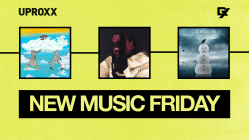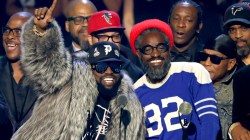
Anybody that knows me knows I’m into older things. I agree with Andre 3000’s verse from the “Walk It Out remix,” where he says, “I could give a damn ‘bout your car, but then I would be, if it was considered a classic, before the drastic changes in production when cars were metal instead of plastic – value’s what I’m talkin’ ‘bout.” Damn, I love value.
I devote my free time to collecting records, seeking, soon-purchasing then flipping classic cars, reading old books, watching old films and chasing women with old souls. This isn’t to sound like the hipster I inevitably will, but rather to make a case for the glory of yesteryear. It’s part of a Capricorn’s nature. We want what we can’t have, and although we always get what we seem to be after, but the one thing we can’t conquer is time. I see some correlation with Hip Hop in the marketplace there.
Of those aforementioned old black & white films that I love to kick back and analyze, my pinnacle is 1950’s Sunset Boulevard. This film comes up in many of my discussions with colleagues and rappers who dig old flicks. I urge all of you to watch it, as any film noir from the era, but this one’s la crème de la crème, homies (Hold your head, Tip).
Without spoiling anything, the film shows a screenwriter ending up by fate, living with an antiquated silent film star, Norma Desmond. Although she’s still got the paper from her glory in the ‘20s, she’s suffering the slings of being face down in the mainstream – or just ignored by the paparazzi/fame. There’s a lot at play in this film, and the script, dialog and conflicts are undeniable. In more ways than I’ll ever be able to express, this film is much parallel to my job in Hip Hop, or rather, my perception of it.
Hip Hop is all about exclusivity. In 2004, if you weren’t up on LRG Jeans, forget about you. In 2003, if you didn’t know that 50 Cent was the future, your opinion wasn’t relevant – Kris Ex was just the first writer with enough brass to get it out there. Right now, if you can’t weigh in on The Leak Volume 6,000, whether you hate it or love it, you’re out of the discussion. We are all about tomorrow, apparent in the many more emails I get concerning rappers “coming out in 2008” than ones who were here even five years ago. Hip Hop is a crowded room, and I’m often torn by who it is that we’re ushering out.
In 2006, I was in New York when I was a features editor for another one of these digitally-dealing Hip Hop sites, and my mentor and I went to a particular rapper’s hotel room for an interview. I’m not going to mention any names in this piece – out of respect, but I can tell you that this was a rapper whose name comes up constantly in interviews today, and somebody who has been in one of the 10 most significant groups in Hip Hop history, from the ‘90s era. The interview was a great one, both sides of my 90-minute Maxell tape was filled with information, jokes were exchanged, secrets revealed and it was a genuinely memorable conversation. As the sun set through the Midtown Manhattan hotel window, it was that very eerie feeling that many men and women undoubtedly feel at a party – it was time to go. The rapper wanted to keep talking, and my mentor and I both kept impregnating the pauses, in hopes of just getting the old up and out. Twenty minutes later, still no luck. Finally, we just left. In the lobby, this still razor-sharp icon invited us “to dinner, to get drinks, or to go to a show.” We couldn’t, and politely denied it. To this day, that’s one of my few professional regrets. Not so I’d have a have a story, or get a free dinner, but because I was literally walking away from a torch-holder in Hip Hop history, with no better reason than a long ride home. Moreover, ten years earlier, and that same guy might not have even given us the time – for he would have been too busy talking to other pesky writers.
This has happened time and time again. I’ve sat in rapper’s offices, and seen gold and platinum records on the wall, from ghost-producing or ghost-writing hits that you would never expect. These are authorships that will never get released to the public, but that changed history. I’ve often wondered if the information got out there, how their legacies would be different, as would their press clippings. People are just so fickle.
There are publicists whom I deal with nowadays, whose names match credits buried in Hip Hop liner notes. They might not realize that the connection is made, but some of the greatest emcees of the ‘80s are the very people who help the new class of Lil’ and Yung [sic] get theirs. It breaks my heart just to think about, and I’ll hear them out to try to support them now, really wishing it was they who was being interviewed.
The “Where Are They Now?” phenomenon is rugged in Hip Hop. Live, and you’ll get forgotten. Die, and you’ll be immortalized on t-shirts, in verses and a growing list of fallen brothers and sisters in this. For as much as I commend the tributes from mainstream artists to Big L, I often wonder if he would have ended up in Kanye West’s “The Glory” lyrics if he wasn’t gunned down – would the same have happened to fellow amazing lyricist Percee P if he had?
Although the Norma Desmond factor is evident in interviews and legacies, what about simple album releases? In late 2006, Ice-T released Gangster Rap, an album that was more talked about for its revealing cover art than its contents. As somebody who doesn’t watch Law & Order: SVU, I find it comforting to know that Ice-T, whose time is worth a fortune, would still bother to attempt another album, full-knowing that the profits are not there. Moreover, Ice brought along fellow veterans Smoothe Da Hustler, Trigga Da Gambler and Grand Daddy I.U. to help him make this masterpiece. Rest assured, as Rock outfits like Scritti Politti or The Cure attempt new releases decades after their glory, the journalism and media embraces them, making a big to do over the effort, the art and the footnotes in history. As Hip Hop, we simply don’t care. I recall that Gangster Rap sold less than 1,000 copies in its first week of sales, and nearly every press campaign – the one I participated in included, focused much more on relic news like “Cop Killer” or his TV show than what Iceberg was even attempting to get at in the album.
Every week, I marvel at the retro artists still attempting careers, still looking for glory. Artists like MC Eiht, Too Short, 8Ball, Grandmaster Caz, Melle Mel, K-Rino or Crucial Conflict release albums in weeks where we pay more attention to over-hyped, under-qualified spitters with nothing to talk about, except how they plan to be a boss in five years, be the next Jay-Z, or in different words – change the minds of those who picked on them (two years ago) in high school.
On the song “Blame Game,” Atmosphere’s Slug beautifully rhymed, “Put your hands up if you remember the Juice Crew / They don’t make ‘em like they used to.” I agree. I miss the quality Hip Hop artists that thrived throughout the ‘80s and ‘90s. Yes, (most of) The Juice Crew performed at this past weekend’s A3C Festival in Atlanta, alongside legions of fledging faces who release three albums a year in search for a better deal. Meanwhile, do you know how long some of us have anticipated another Big Daddy Kane release, or how often a Biz Markie sample will appear in other peoples’ miscredited production? The Juice Crew is a cool thing to talk about, make a retro t-shirt about, get a picture for your Myspace page with a camera phone with… but how many of us would respect them in releasing an album before being about, what we’ve deemed, “some next shit“?
Perhaps I sound like Andy Rooney even in writing this. This is hardly a rant; if it appears so, I apologize. But I’ll never forget The Beatnuts saying they were calling it quits after Milk Me, or the break-up of Jurassic 5 or Organized Konfusion simply because we don’t care. I listen to Snoop Dogg‘s “Can’t Say Goodbye,” and I wish a million young people in the struggle could hear this. For as much as I dug “Gangbangin’ 101” on the last album, this what The Game, Young Jeezy and even 50 Cent aren’t likely to tell you in their records. The song chronicles how hard it is to grow up, get looked at differently, and still want to access where it is you came from. Sort of like Carlito’s Way, but most rappers must not have seen how that movie ended. Snoop Dogg, although he’ll chase platinum, as always, with Ego Trippin’, isn’t getting the respect he deserves for changing sounds late in his career, and doing it with Teddy Riley and DJ Quik no less. Instead, we brandish, “Aw man, Snoop sold out,” but when Ice-T made Gangster Rap, the argument was reversed.
Neil Young, David Sanborn and even Madonna put up numbers after 30 years, with or without radio, because these voices meant something to listeners then, now and always. In Hip Hop however, we seem to much prefer to drink from the fountain of youth every Tuesday, disregard our pioneers, veterans and torch-passers, but then have the nerve to redo their sacred classics, run up on them for pictures and casually mention their names in interviews, so we appear to be up on it. And on that note, I’m off to the car to play my EMC album; Masta Ace and crew remind me what Freddie Foxxx told me years ago, “Never trade youth’s energy for experience’s wisdom.” And there it is.









